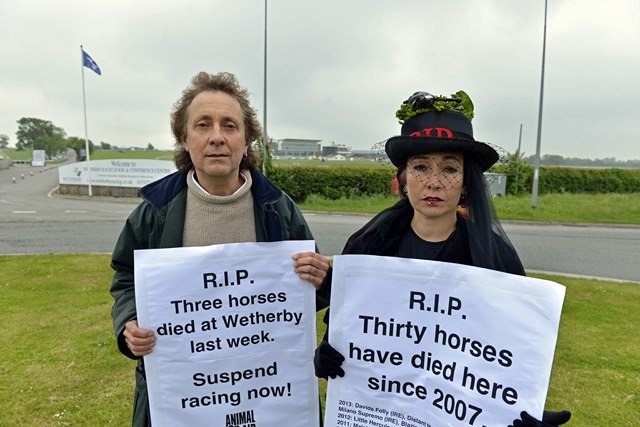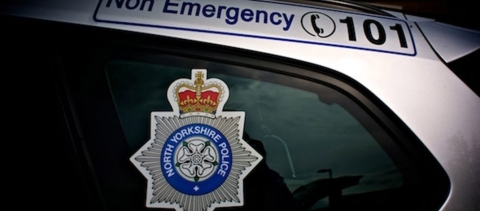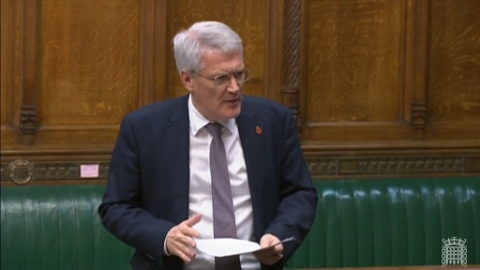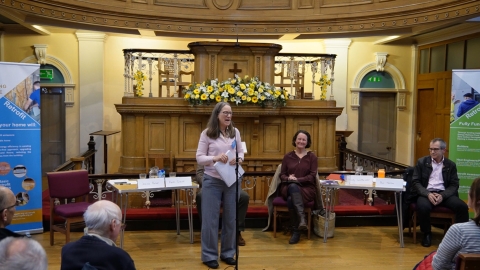On 23 May 2013 Wetherby Racecourse had three horse fatalities on a single day prompting concern from national campaign group, Animal Aid.
Milano Supreme, Distant Memories and David’s Folly were all killed after falling and sustaining fatal injuries in separate hurdle races during the afternoon. Milano Supreme took a crashing fall at the sixth obstacle in the 2.40 Selling Hurdle. In the 3.55, Distant Memories fell in front of the stands but was quickly hidden behind screens before being destroyed. He was ridden by jockey Richard Johnson and trained by Tim Vaughan, as was the third victim of the day, David’s Folly. This horse was four years old and suffered horrific injuries that saw the lower bones of her right hind leg shattered.

Animal Aid’s Horseracing Consultant, Dene Stansall, travelled to the course on 30 May 2013, to remind those attending the Yorkshire Post Ladies’ Evening event of the risk posed to horses in commercial racing. He was accompanied by a supporter dressed as the ‘spectre of death’ – a Victorian lady, garbed in dark, gothic robes, wearing a striking hat that features a model race horse tumbling over a hurdle.
This is not the first time that multiple deaths have occurred during a single day’s racing at the West Yorkshire track. On 26 April 2009, three horses lost their lives, and four were killed on 14 October that same year.
According to Animal Aid’s statistics, seven horses have died as a result of falls at the course since Christmas, and a total of 30 horses have died during the last six years.
Animal Aid, as the national campaign group, has written to the British Horseracing Authority (BHA) to remind the regulator of its statutory duty for animal welfare at horse racing events, and to ask for a prompt and thorough inquiry into last week’s fatalities, followed by remedial action.
Animal Aid’s Horse Racing Consultant, Dene Stansall:
Yet more horses have lost their lives at Wetherby racecourse. The British Horseracing Authority must launch a thorough investigation and then take firm action to remedy the shocking record of horse fatalities at Wetherby.
We had hoped that tomorrow’s event would be cancelled in the interest of horse welfare, but as this is not the case, Animal Aid will be on hand to remind punters that “a harmless flutter” could mean more horse deaths.
Jonjo Sanderson the Chief Executive of Wetherby racecourse said:
Nobody wants this to happen and these are three unfortunate deaths.
As a racecourse we are licenced by the British Horse Racing Authority, and they regularly inspect the course. This means that we have to meet the standards laid down by them.
One of the recent deaths was likely down a horse suffering a heart attack on the approach to a jump and one of the others was a fallen horse being trampled by another horse.
Looking at the previous five years though, the number of fatalities at Wetherby is below the national average.
[sam id=”4″ codes=”true”]
A spokesperson for the RSPCA commented:
Our equine consultant has examined the footage from Wetherby:
The RSPCA is always deeply saddened by the deaths of any racehorses including the three tragic fatalities at Wetherby.
We have always had concerns about the inconsistent behaviour of horse racing hurdles and we are presently working with the racing industry in an attempt to improve the safety of the obstacles.
The deaths on this occasion, however, appear to have been caused by jumping errors rather than the course itself.
The RSPCA always works with the horse racing authorities to ensure that any standards governing the sport are adhered to and to offer constructive input where appropriate.
A spokesperson for the British Horse Racing Authority said:
We are saddened to hear of the recent fatalities at Wetherby Racecourse. No one will be more saddened though than the connections of the horses in question.
Racing is a sport that carries risk, and British Racing is open and transparent about the risks involved. That risk will never be eliminated, in the same manner that it cannot be eliminated from any equine pursuit.
As is the case with every equine injury the details of the incidents involved will be collated, and if there is any evidence of a trend which links any incidents then this can be examined. At this stage there is no evidence of any link between the incidents in question.
There are 14,000 horses in training at any one time in British Racing. These horses are provided with levels of care which elevate them above most other domestic or domesticated animals in the world. In exchange for this level of care we ask them to do what they are bred to do, namely race – with a very low level of risk. Of the 40,000 or so runners each year in British Jump Racing the average fatality rate is just below 00.5%
It is typical of Animal Aid, who are not a welfare group, nor are they a charity, to exploit sad events like the fatalities at Wetherby in order to drive their own public profile. Animal Aid’s stated aim is to ban all horseracing, despite the disastrous effect this would have on the thoroughbred racehorse as a breed, and the rural economy. Animal Aid also promote an entirely vegan lifestyle and regularly campaign against health charities.
It is also typical of Animal Aid to be entirely misleading or false with their statistics. Wetherby has an excellent overall record when it comes to equine welfare. Over the last few years the average fatality rate at Wetherby has been around 00.36% of all runners, making it well below the national average.





